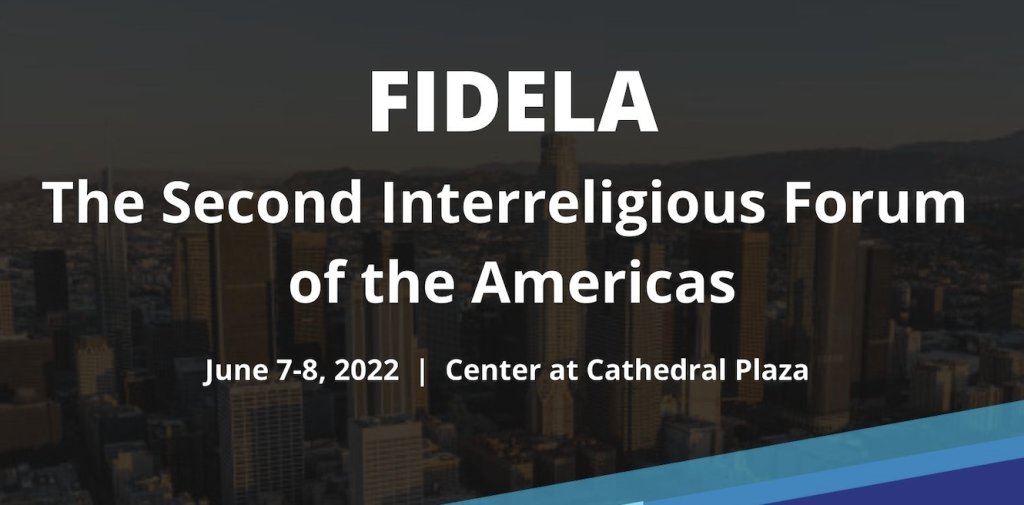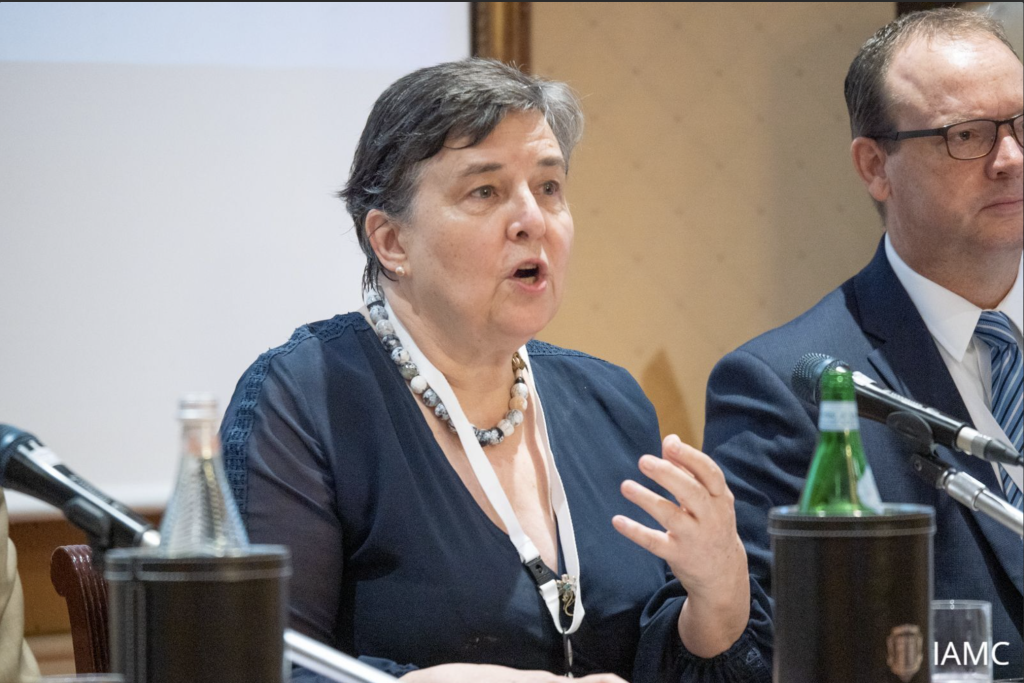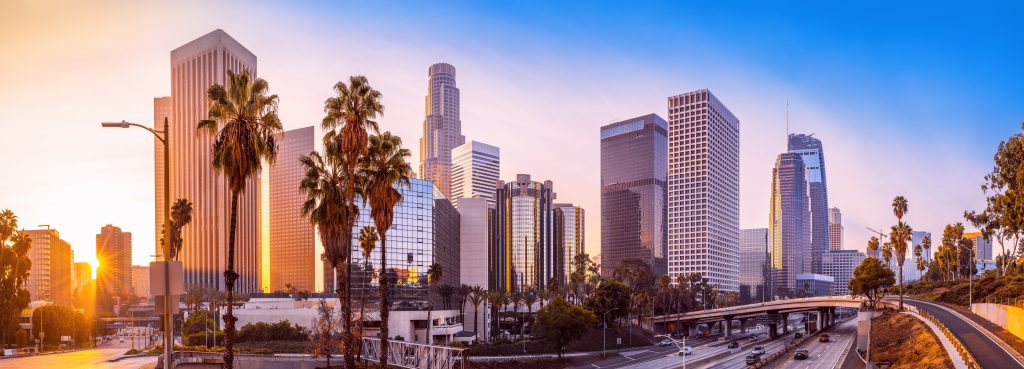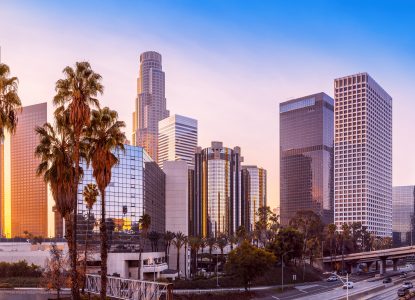By JoAnne Wadsworth, Communications Consultant, G20 Interfaith Forum
– – –
On Tuesday, June 7, the Second Interreligious Forum of the Americas (FIDELA) officially convened in Los Angeles, California in conjunction with the 9th Summit of the Americas. The FIDELA forum brought together hundreds of religious actors, civil society leaders, and policymakers for two days of discussion surrounding important issues faced by the people of North and South America. The event was co-organized by the G20 Interfaith Forum (IF20); the Berkley Center for Religion, Peace & World Affairs at Georgetown University; The International Center for Law and Religion Studies (ICLRS); Religions for Peace; and the Interreligious Council of Southern California (ICSoCal).

Welcoming Remarks
Welcoming remarks were offered by representatives of each of the co-organizing organizations, including Rev. Masahiro Nemoto, Deputy Secretary General Ad Interim, Religions for Peace;
Prof. W. Cole Durham, Jr.,President,G20 Interfaith Forum Association; Prof. Katherine Marshall, Senior Fellow, Berkley Center for Religion, Peace and World Affairs, Georgetown University and Executive Director, World Faiths Development Dialogue (WFDD); Prof. Gary Doxey, Associate Director,International Center for Law and Religion Studies (ICLRS), Brigham Young University (BYU); Swami Mahayogananda, President, Interreligious Council of Southern California (ICSoCal); and Joumana Silyan-Saba, Director of Policy and Discrimination Enforcement, Civil + Human Rights and Equity Department, City of Los Angeles and International Trustee, Religions for Peace. Elias Szczytnicki, Secretary General, Latin American and Caribbean Council of Religious Leaders – Religions for Peace, moderated the discussion.
Elias Szczytnicki began the inaugural session by formally welcoming all speakers, participants, and audience members to the event. As the main organizer behind the first FIDELA conference, he expressed his happiness that this second event had much higher international participation, with voices from many different countries in the region, representing the very rich religious diversity of the Americas.
Before introducing the first round of speakers, Szczytnicki invited all to stand and join together in a moment of silence and prayer, asking for the success of both FIDELA and the Summit of the Americas. He then invited representatives from each of the event’s co-organizers to offer welcoming remarks.
Masahiro Nemoto
Nemoto centered his comments on the goal of the event, which aligns with the goals of Religions for Peace: to provide a multireligious and multisectoral platform for religious leaders, civil society actors, and policymakers to come together and discuss the most urgent issues of the hemisphere, offering their unique perspective to the government leaders gathering at the Summit of the Americas.
“In order to solve the most urgent problems, we must abandon ‘only this’ or ‘only that’ behavior. We need to transform our minds from the attitude of ‘only religious people, only my religion, only my country, only my region.’ We cannot afford to act alone. We cannot solve these problems unless we act together.”
Cole Durham Jr.
Durham focused his remarks on the journey to this conference, which came together with near-miraculous timing, and lessons learned about interreligious conferences based on work with the G20 Interfaith Forum. He focused on a few key points:
- Religious circles share both common cores and values and concerns.
- The issues covered by the United Nations Sustainable Development Goals (SDGs) are ones that religious communities have been dealing with and working to solve for many years, so religious perspectives and expertise should be highly valued.
- While the focus of these conferences is to generate messages for global leaders, perhaps even greater is the power of the networks and connections being built between leaders in the rooms and halls of the conference. There is power in going forward in cooperation.
“On a certain level, the Americas have learned to work together. We have a distinctive and promising legacy of diversity. Most of the pressing religious freedom issues in the globe have avoided our hemisphere. We have done much. And we have the promise of so much more.”
Katherine Marshall
Marshall built on Durham’s comments, emphasizing the importance of bringing religious voices, actions, and principles to the table when global agendas are being discussed. She said this is easier said than done, but reiterated its importance in wake of the COVID-19 pandemic, calling on principles expressed by the poet Amanda Gorman:
“May we not just grieve, but give.
May we not just ache, but act.
May we choose our children over chaos.”
In order to seize this “Kairos Moment” of critical post-pandemic change and opportunity, Marshall suggested focusing on these areas where religious perspectives are particularly relevant:
- Overcoming the troubling, deep polarization that we’re seeing globally, linked to inequality and injustice
- Addressing violence, building peace, and finding ways to live together
- Caring for the most vulnerable and translating that into concrete action, especially in protecting and helping children
- Battling corruption
- Acting for the planet

Gary Doxey
Doxey focused his comments on the importance of recognizing and protecting religion’s integral role in society.
“Religion is at the foundation of so much in our societies—in our North and South American societies especially. It influences healthcare, education, and the moral foundations of our rule of law. Because of this, it should be at the heart of so many policy discussions—not in a way that disrespects the separation of church and state, but to shine a light on the way it informs our cultures, our identities, and our communities.”
He emphasized that Religious Freedom must be an important aspect of all of these conversations, as ideals of equity and equality for all cannot be achieved without freedom of belief and freedom to express those beliefs in safety.
Swami Mahayogananda
Mahayogananda welcomed all through an old traditional prayer, typically chanted as worshippers prepare to receive spiritual teachings. He emphasized the concept that we are all interconnected—all one—and that we must all arrive at peace together.
“May we protect one another as we come together to learn from each other and support each other. May we be nourished together and nourish each other. May we gather strength together. May we become strong enough that we realize that there is no outsider, but that we are all together in one. May what we learn shine forth in our lives. May we not find fault in one another, seeing the ocean in a drop of goodness. May we touch the reservoir of peace in our being. Peace, peace, peace.”
Joumana Silyan-Saba
Silyan-Saba officially welcomed the forum to Los Angeles.
“Here in the City of Angels, we take pride in being the most multireligious city not just in the United States, but in the world. We are a city of immigrants, with some of the largest diasporic communities outside their native countries in the world. Within the vibrant tapestry of LA we find beauty and strength—beauty in our traditions, and strength as we come together to tackle some of the toughest challenges of our time. We stand together to protect houses of worship, to speak out against hate and violence, and to bring our communities together.”
She also spoke of the large impact religious actors made during the pandemic, and the crucial need for governments to continue collaborating with religious actors for good. She expressed hopes that the FIDELA event would be the beginning, not the end, of these conversations.

Keynote Addresses: Contributions of Religions to Building a Sustainable, Resilient and Equitable Future in the Americas
Panelists included Gabriela Mulder, Former President, Alliance of Presbyterian and Reformed Churches of Latin America (AIPRAL) and Coordinator, Latin American and Caribbean Women of Faith Network (LACWFN); Elder L. Whitney Clayton, Emeritus General Authority and Former President of the Seventy, The Church of Jesus Christ of Latter-day Saints; Rabbi Gustavo Kraselnik, Representative, Latin American Jewish Congress (CJL), and, President, Interreligious Committee of Panama (COEPA); Prof. Alejandro Werner, Director, Georgetown Americas Institute; Prof. Melissa Rogers, Executive Director, White House Office of Faith-Based and Neighborhood Partnerships; and Ambassador Rashad Hussain, Ambassador at Large for International Religious Freedom, United States Department of State.
Melissa Rogers
Rogers extended warm greetings from the White House to conference viewers and participants, highlighting the US government’s support of these initiatives. She then looked at three things to promote healing for the most vulnerable, increase unity, and strengthen communities:
- Encouraging and strengthening partnerships between governments and religious communities while respecting proper boundaries. We’re increasingly learning that these partnerships are not optional—they’re essential.
- Promoting even more widely the principle of religious liberty while combatting hate and discrimination. The biggest strides against hate are made when people work together, uniting as individuals of equal dignity and going to bat for each other’s rights.
- Building bridges across ideological and political divides. It’s never been harder, but it has also never been more important. There’s so much that unifies us if we’re only willing to look at it.
Gabriela Mulder
Mulder also shared three points, these ones geared toward showing what religions can contribute in an inequal, unstable, unjust, and hurting post-pandemic world:
- Faiths can create community resilience by providing a source of wellbeing, welcome, stability, and strength in the face of crisis. Mental health studies throughout the pandemic have shown that.
- Faiths can build spaces with other organizations to improve the unjust present in concrete ways: Community soup kitchens, food banks, workshops, information programs, employment help, and more.
- Faiths also have a high capacity for advocacy. They can advance joint initiatives to influence state and international organizations at all levels, offering a clear prophetic voice to improve our present situation.
Whitney Clayton
Clayton centered his comments on the power of true religion to cure the ills of the world. He said though there is no defense for the actions of violent extremist groups, there is also no defense for throwing all the benefits of religion and religious activities out with the trash. As religious belief increases, people’s contributions to society improve, and our ability to nurture each other improves as well.
“The benefit of religion in addressing real problems on the ground is incalculable. What we do may not sell newspapers, but it’s better than stories of shootings and stress, turmoil and terror.”
Clayton also emphasized the core concepts that all people of faith share: a basic belief in the golden rule, along with a belief that we’ll be held accountable for our conduct. He said if people of faith work together for the common good, presenting themselves to governments as part of the solution rather than part of the problem and lending a hand to those in need, huge steps forward can be made in our communities, societies, and countries—especially if religious freedom is respected.
Gustavo Kraselnik
Kraselnik called on the famous intro to Charles Dickens’ A Tale of Two Cities to encapsulate his thoughts on our current moment:
“It was the best of times, it was the worst of times,
It was the age of wisdom, it was the age of foolishness,
It was the epoch of belief, it was the epoch of incredulity,
It was the season of Light, it was the season of Darkness,
It was the spring of hope, it was the winter of despair.”
He cited various statistics on what the pandemic has done to the Americas, including disproportionately high COVID-19 cases and deaths, an increase in corruption, huge economic setbacks, lost advancements in health and education, and more—many of which easily bring feelings of hopelessness.
However, he also highlighted how many have nurtured empathy and solidarity throughout the region during the pandemic, showing the resilience of both people and organizations, and displaying the importance of religious organizations and communities. Through gathering together in the FIDELA forum with a deep commitment to find answers to the urgent needs of the peoples of the Americas, it can be the spring of hope.
Alejandro Werner
Werner focused his comments on the role that religions will play in the larger challenges that Latin America will be facing in the next decade as we work to recover from the pandemic.
He cited estimates that Latin America will continue to grow at 2.5 to 3 percent per year, but that it will remain 4 to 5 percent below pre-pandemic expectations almost indefinitely—with a gap that will never close. That loss will be most heavily concentrated on the poorest sector of society, with the aggregate effects of the struggling economy hurting the most vulnerable worst of all. With a reversal in poverty gains, huge losses in childhood school instruction, and more, he said Latin America needs a new social contract to restart growth and job creation, bring a better fiscal policy, and strengthen support to the population.
Rashad Hussain
Hussain centered his remarks on the critical role that religions have played in advancing goodness around the world.
“The reality is that any time a person anywhere in the world is motivated by something positive they learned in their religious upbringing, that’s the impact of religion on our society. These people may not be what we consider to be ‘religious people.’ But the fact that they’ve been inspired and shaped by religion is something we need to acknowledge … I would hate to imagine a world where religions weren’t inspiring so many people to do good and preventing so much harm. But we can do so much more.”
He said that along with advancing religious freedom, USCIRF also has a strategic religious engagement unit to build relationships with civil society on foreign policy priorities. In the same vein, he said the Summit of the Americas cannot advance its goals without partners in civil society—namely community actors and faith-based institutions.
Last, he highlighted three pressing issues that would benefit from diplomats and faith actors working together, especially in helping the most vulnerable:
- The Climate Crisis
- Health and Pandemic Resistance
- Migration
Conclusion
In conclusion, Szczytnicki thanked everyone for their attendance and participation, and invited them to dive deep into impactful and meaningful discussions throughout the remaining sessions of the conference.
– – –
JoAnne Wadsworth is a Communications Consultant for the G20 Interfaith Association and acting editor of the “Viewpoints” blog.


